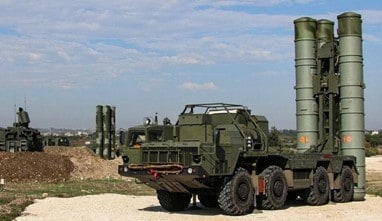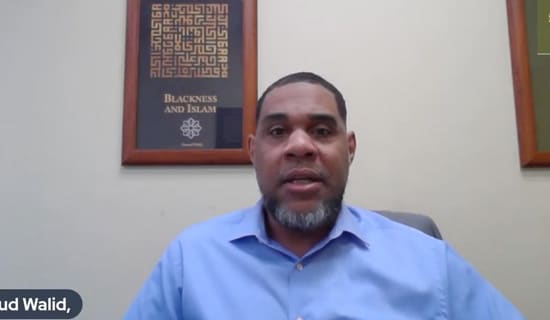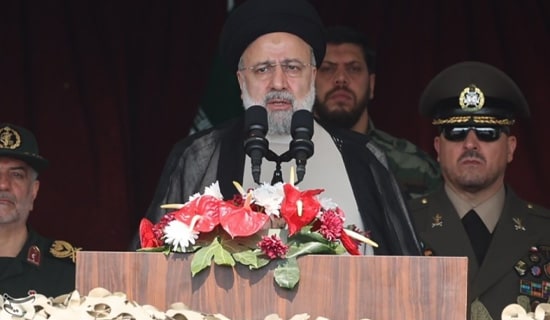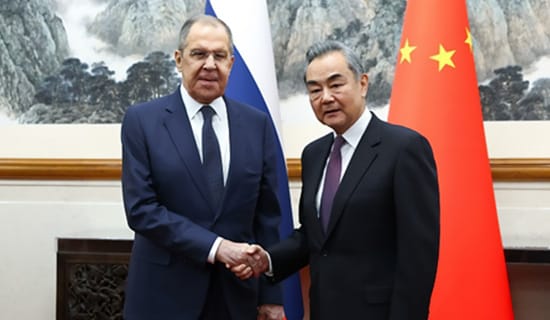In 2017, Russia signed a USD $2.5 billion contract with Turkey under which it would supply the latter with S-400 air and missile defense systems – two S-400 regiments, each comprising two battalions, with each battalion comprising eight launchers with four missile tubes apiece. That same year, in Ankara, the two countries also signed a loan agreement stipulating that Turkey would pay 45 percent of the cost of the S-400s up front and Moscow would lend Turkey the funds for the remaining 55 percent. The Russian loan was in Russian rubles, saving Turkey up to 3 percent of the total debt.[1]

S-400 air and missile defense systems (Source: Hurriyetdailynews.com)

Dr. Pavel Luzin, expert in Russian foreign policy, defense, and space, and author of this article.
Russia Was Interested In Driving A Wedge Between NATO And Turkey
In November 2019, Alexander Mikheev, director-general of Rosoboronexport,[2] Russia's sole state export and import intermediary agency for defense-related products, announced that despite U.S. sanctions against Russia, Moscow had delivered all the components of the first batch of the S-400 air defense system to Turkey ahead of schedule.[3]
Russia's friendly loan and rapid delivery of the first batch of the S-400 systems were aimed at fulfilling the contract as soon as possible, in defiance of the pressure on Turkey by the U.S. which strongly opposed the deal. Russia was actually interested in driving a wedge between NATO and its member state Turkey. Indeed, the U.S. expulsion of Turkey from the F-35 program in 2019 attested to Russia's partial achievement of this goal.[4]
However, in the summer of 2020, Russia and Turkey launched new negotiations for the delivery of the second S-400 regiment,[5] and as of September these negotiations are still in progress.[6] These negotiations indicate that the original deal actually involves two separate contracts, one for each S-400 regiment. Despite the official confirmation from Russian state-owned holding conglomerate Rostec that Turkey had paid for the first delivery of the system,[7] the situation looks more complicated for the second delivery.
Russia's Interest In Turkey's UAV Technologies
In the negotiations for the delivery of the second S-400 regiment, Russia appears to be unwilling to deliver the system on the favorable financial terms it provided in 2017. In fact, Russia needs significant economic or/and political benefit in order to agree with Turkey on a loan relying on a weak Russian ruble and including a possible technology transfer. However, Ankara has something that Russia is interested in: Turkey's Unmanned Aerial Vehicle (UAV) technologies.
In 2020, Moscow was shocked by how effective the Turkish combat Bayraktar TB2 UAVs were in Syria, Libya and Nagorno-Karabakh against Russia's allies and against those Russia was betting on.[8] The Russian armed forces still have no comparable capabilities.
Russia's advanced Orion reconnaissance UAV (developed by Kronshtadt Group by order of the Russian Ministry of Defense) acquired the combat version only by the end of 2020 and first demonstrated it in Syria in 2021.[9] The heavy Altius UAV (developed by UZGA) also recently acquired a combat version, which will be delivered to the Russian armed forces in autumn 2021.[10]
However, both projects face significant deficiencies in manufacturing: from the limited productive capacity itself (for instance, Kronshtadt is building a factory that would produce up to 45 UAVs annually after 2022)[11] to the limited availability of engines and electronics due to sanctions.[12] Therefore, Russia has a crucial need for access to advanced UAV technologies, in order for them to be reproduced by the Russian industry and to compete with the Western market.
The Putin-Erdogan Meeting in Sochi
SUPPORT OUR WORK

Turkey, with its developed aerospace program of medium and heavy combat UAVs, is the only option for Russia. Acquiring Turkish UAVs seems to be even more urgent for Russia after the Ukrainian Armed Forces' 2019 purchase of six Bayraktar TB2 UAVs and three ground control stations from Turkey. At the moment, the Ukrainian army currently has 12 Bayraktar TB2 UAVs in its inventory. In July 2021, Turkey also delivered the first batch of TB2s to the Ukrainian Naval Forces.[13] In September 2021, it was reported that Ukraine plans to buy 24 more Turkish drones.[14] Besides Ukraine, it is worth noting that the Bayraktar TB2, which entered the Turkish army's inventory in 2014, is used by several other countries, including Qatar and Azerbaijan.
In April 2021, Turkish Foreign Minister Mevlut Cavusoglu stressed that the deal with Ukraine "is not aimed against Russia." He added: "Turkey is selling its drones to those who need them... If Russia has a need to buy our products, it can buy them, just like we earlier purchased its S-400."[15]
Meanwhile, Turkish President Recep Tayyip Erdogan reiterated in an interview that Turkey still intends to buy a second S-400 regiment. The State Department immediately reacted by threatening Ankara with new sanctions. "We urge Turkey at every level and opportunity not to retain the S-400 system and to refrain from purchasing any additional Russian military equipment... We continue to make clear to Turkey that any significant new Russian arms purchases would risk triggering CAATSA 231 sanctions separate from and in addition to those imposed in December 2020 [i.e. 2017 Countering America's Adversaries Through Sanctions Act],"[16] the State Department stated.
Turkey-U.S. relations are becoming increasingly strained. In a recent press conference, Erdogan said: "I worked well with George W. Bush, Barack Obama, and Donald Trump, but I cannot say we started well with Joe Biden... After 19 years in office, I can't say that we have reached a good position with the U.S.... The U.S. must understand that Turkey won't step back from the S-400 deal."[17]
On September 29, 2021, Erdogan went to Sochi to meet with Russian President Vladimir Putin. During the meeting, Erdogan stressed that Turkish-Russian relations, including political, economic, trade, military, and defense, as well as industrial ties, "are progressing." After the nearly three-hour meeting, Putin said that the talk had been "useful" and "inclusive."[18]
As Turkey finds itself amid tensions with the U.S., Russia may now be in a position to negotiate a new deal for a second batch of S-400 on terms favorable to it – which would include advanced Turkish UAV technologies.
*Dr. Pavel Luzin, PhD, is an expert in Russian foreign policy, defense, and space.
[1] Ria.ru/20210928/frantsiya-1752237086.html, December 27, 2019.
[2] Rostec.ru/en/about/companies/659/
[3] Roe.ru/press-centr/press-relizi/rosoboroneksport-podvel-itogi-19-go-goda-raboty-na-mirovom-rynke/?from_main, November 1, 2019.
[4] Defensenews.com/air/2019/07/17/turkey-officially-kicked-out-of-f-35-program/, July 17, 2019.
[5] Rbc.ru/politics/28/07/2020/5f2014079a7947c287710f34, July 18, 2020.
[6] Tass.ru/armiya-i-opk/12194603, August 23, 2021; Ria.ru/20210829/s400-1747726391.html, August 29, 2021.
[7] Interfax.ru/russia/740186, December 7, 2020.
[8] Ridl.io/ru/bitvy-robotov-rossijskij-podhod/, April 16, 2020.
[9] Ria.ru/20210404/siriya-1604135512.html, April 4, 2021.
[10] Rg.ru/2021/08/26/pervyj-udarnyj-bespilotnik-altius-postupit-v-vojska-uzhe-oseniu.html, August 26, 2021.
[11] Ria.ru/20210820/bespilotniki-1746359692.html, August 20, 2021.
[12] Newizv.ru/article/general/22-02-2021/dvoe-sutok-bez-posadki-na-zemlyu-zachem-nashey-armii-bespilotniki-altius, February22, 2021.
[13] Aa.com.tr/en/world/ukraine-plans-to-purchase-24-more-turkish-drones/2362975, September 13, 2021.
[14] Aa.com.tr/en/world/ukraine-plans-to-purchase-24-more-turkish-drones/2362975, September 13, 2021.
[15] Tass.com/defense/1280693, April 21, 2021.
[16] Dailysabah.com/business/defense/us-says-turkeys-purchase-of-more-s-400s-to-trigger-new-sanctions, September 27, 2021.
[17] Dailysabah.com/politics/diplomacy/i-worked-well-with-bush-obama-and-trump-but-not-biden-erdogan, September 23, 2021.
[18] Youtube.com/watch?v=arB3Wxz7Hkg, September 29, 2021.




